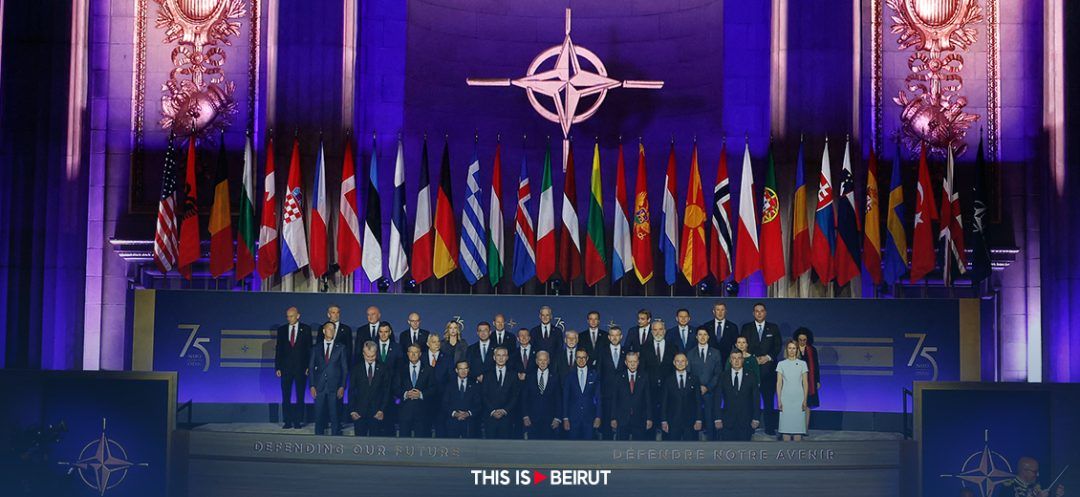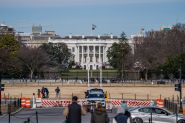- Home
- Middle East
- NATO Criticize China, as it Begins Military Exercises in Belarus

©(Photo by Kevin Dietsch / GETTY IMAGES NORTH AMERICA / Getty Images via AFP)
China is staging army drills with Belarus this week at NATO's eastern border, in a sign of escalating tensions between Beijing and the US-led defense alliance.
The joint "antiterrorist" exercises on Russian ally Belarus's soil near the Polish border come as NATO leaders gather for a summit in Washington, with the war in nearby Ukraine high on their agenda.
With relations between NATO on the one hand and China and Russia on the other at a low ebb, analysts believe that Beijing wanted to send the alliance a warning message with the timing of the drills.
The exercises began July 8 in Brest, a city right on the border with Poland, according to a statement issued by the Chinese defense ministry.
The statement said the maneuvers will last until mid-July, but did not give the exact number of Chinese soldiers involved.
Poland's defense ministry slammed the timing of the exercises.
It warned of "the risk of the operations in question being used for disinformation and propaganda purposes... to coincide with the NATO summit".
The exercises come as Beijing, one of Moscow's key partners, is also experiencing increasingly tense relations with NATO.
Analysts believe that date and location of the exercises were not chosen by chance, arguing that China wanted to send NATO a message.
"Multilateral exercises are often used to send political signals," Kelly Grieco of the Stimson Center foreign policy and defense think tank told AFP.
Countries often organize their joint exercises to coincide with developments abroad -- not least of them China, added Alice Ekman, senior analyst for Asia at the European Union Institute for Security Studies (EUISS).
Similarly, China staged military maneuvers in the South China Sea in May 2024 as the US-Japan-Philippines-Australia meeting was in full swing, she added.
As well as moving closer to Russia, China is becoming increasingly hostile to NATO.
It accuses NATO of working to contain China with Beijing worried about the alliance's expanding role in the Asia-Pacific region.
It also believes that the alliance has already overstepped its geographical sphere of influence in Iraq, Libya and Afghanistan.
NATO has also criticized China's role in supporting Russia's war in Ukraine.
Alliance leaders said in a declaration from their summit in Washington on Wednesday that China had "become a decisive enabler of Russia's war against Ukraine".
It said Beijing's "so-called 'no limits' partnership" and "large-scale support for Russia's defense industrial base" were of "profound concern".
In response, a spokesperson for Beijing's mission to the European Union said: "NATO should stop hyping up the so-called China threat and provoking confrontation and rivalry."
The United States and Europe have also accused Beijing of selling components and equipment necessary to keep Moscow's military production afloat.
US Secretary of State Antony Blinken said in April this included "machine tools, semiconductors, other dual-use items that have helped Russia rebuild the defense industrial base that sanctions and export controls had done so much to degrade".
Fabien Zamora, with AFP
The joint "antiterrorist" exercises on Russian ally Belarus's soil near the Polish border come as NATO leaders gather for a summit in Washington, with the war in nearby Ukraine high on their agenda.
With relations between NATO on the one hand and China and Russia on the other at a low ebb, analysts believe that Beijing wanted to send the alliance a warning message with the timing of the drills.
The exercises began July 8 in Brest, a city right on the border with Poland, according to a statement issued by the Chinese defense ministry.
The statement said the maneuvers will last until mid-July, but did not give the exact number of Chinese soldiers involved.
Poland's defense ministry slammed the timing of the exercises.
It warned of "the risk of the operations in question being used for disinformation and propaganda purposes... to coincide with the NATO summit".
The exercises come as Beijing, one of Moscow's key partners, is also experiencing increasingly tense relations with NATO.
Strategic signal
Analysts believe that date and location of the exercises were not chosen by chance, arguing that China wanted to send NATO a message.
"Multilateral exercises are often used to send political signals," Kelly Grieco of the Stimson Center foreign policy and defense think tank told AFP.
Countries often organize their joint exercises to coincide with developments abroad -- not least of them China, added Alice Ekman, senior analyst for Asia at the European Union Institute for Security Studies (EUISS).
Similarly, China staged military maneuvers in the South China Sea in May 2024 as the US-Japan-Philippines-Australia meeting was in full swing, she added.
China-NATO tensions
As well as moving closer to Russia, China is becoming increasingly hostile to NATO.
It accuses NATO of working to contain China with Beijing worried about the alliance's expanding role in the Asia-Pacific region.
It also believes that the alliance has already overstepped its geographical sphere of influence in Iraq, Libya and Afghanistan.
NATO has also criticized China's role in supporting Russia's war in Ukraine.
Alliance leaders said in a declaration from their summit in Washington on Wednesday that China had "become a decisive enabler of Russia's war against Ukraine".
It said Beijing's "so-called 'no limits' partnership" and "large-scale support for Russia's defense industrial base" were of "profound concern".
In response, a spokesperson for Beijing's mission to the European Union said: "NATO should stop hyping up the so-called China threat and provoking confrontation and rivalry."
The United States and Europe have also accused Beijing of selling components and equipment necessary to keep Moscow's military production afloat.
US Secretary of State Antony Blinken said in April this included "machine tools, semiconductors, other dual-use items that have helped Russia rebuild the defense industrial base that sanctions and export controls had done so much to degrade".
Fabien Zamora, with AFP
Read more



Comments